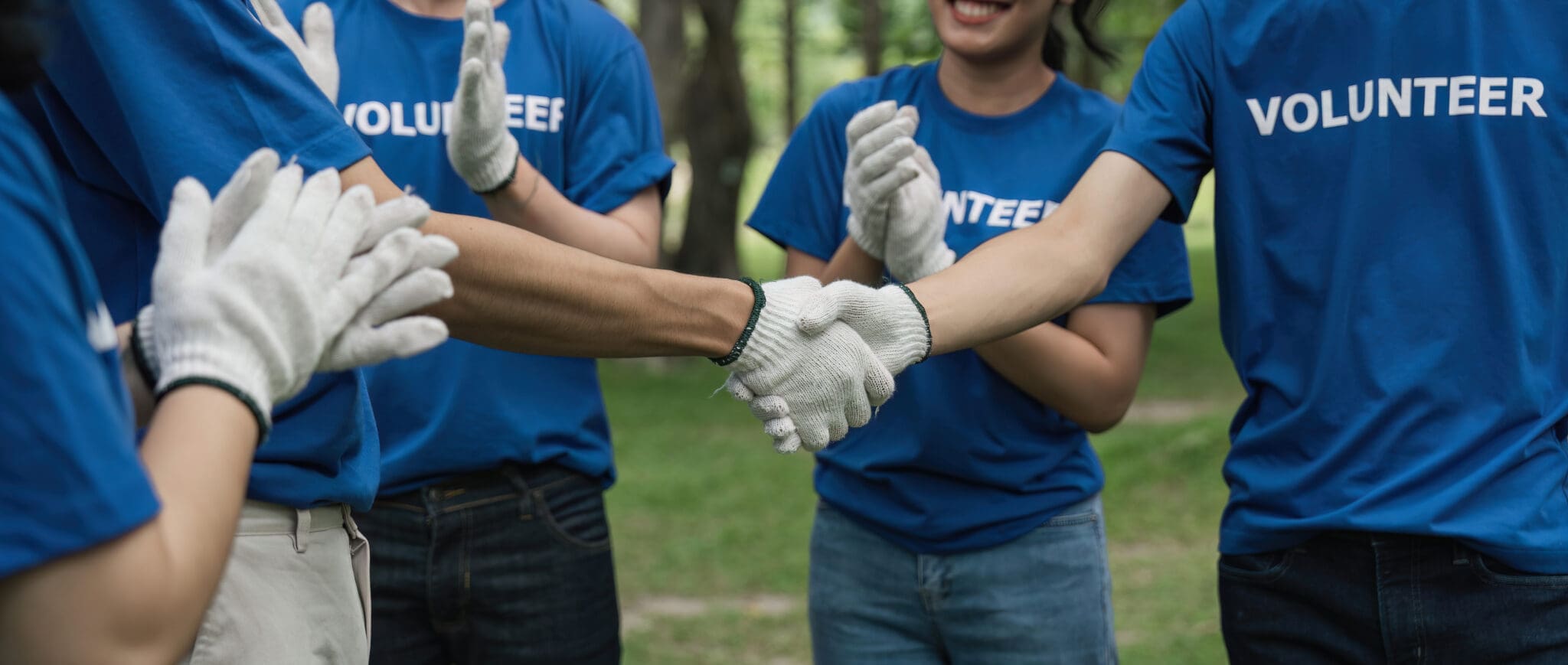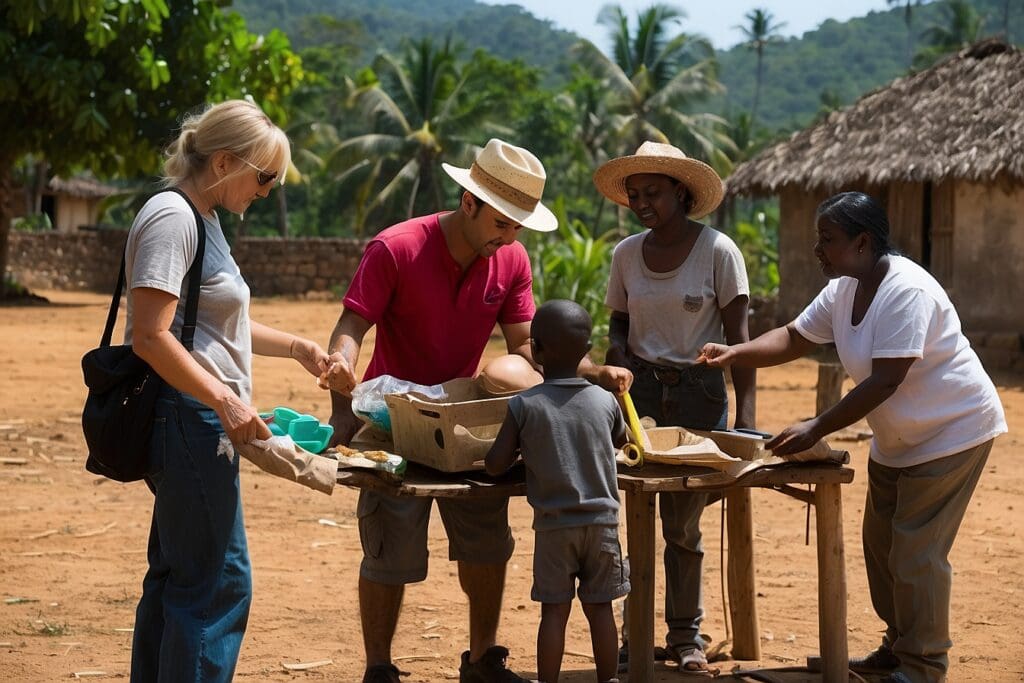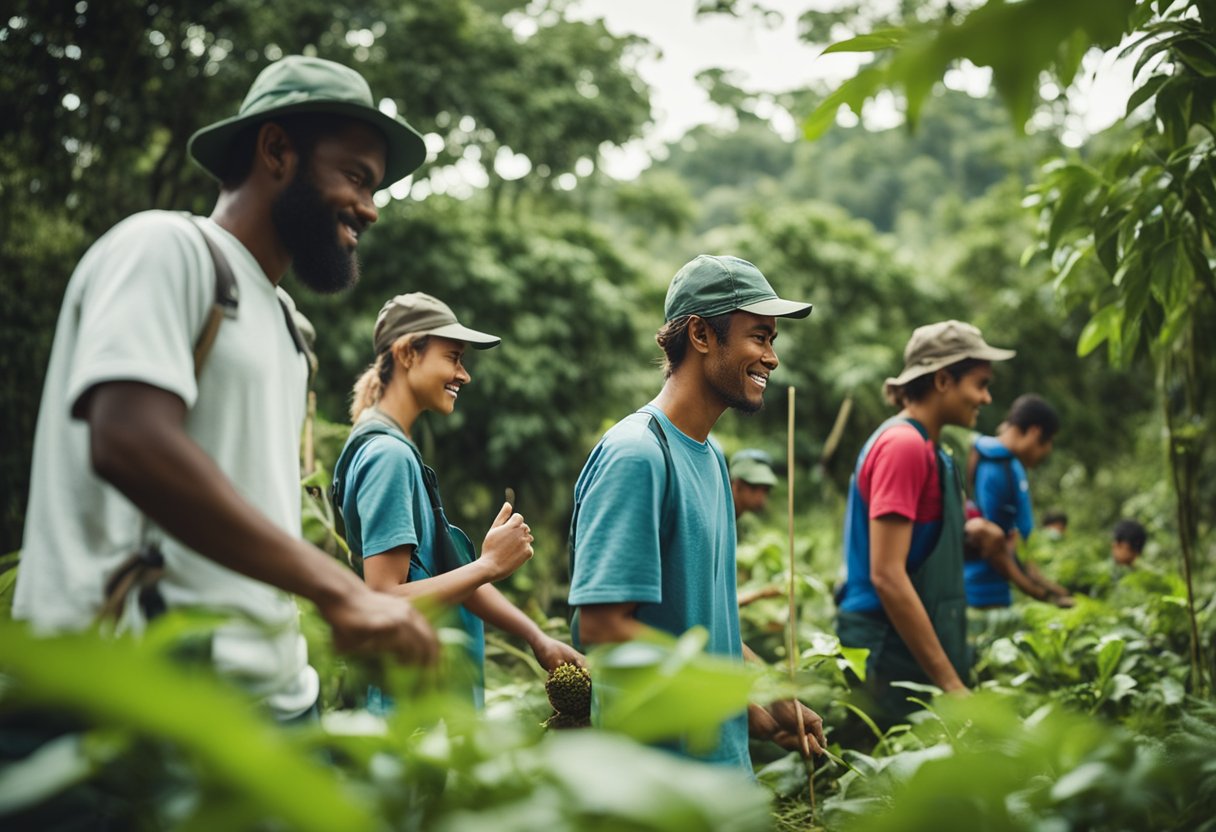Voluntourism: Helping or Harming? The Ethics of Volunteer Travel

Updated On: April 04, 2024 by Raghda Elsabbagh
Voluntourism sits at a complex intersection of travel, altruism and ethics. It’s a form of tourism where individuals seek to help others by volunteering, usually in a country other than their own. This practice has attracted significant attention due to its growing popularity amongst those who desire to contribute to global communities while exploring new cultures. However, voluntourism’s impact is subject to extensive debate; some praise it for fostering cultural exchange and aid, while others criticise it for potential harm to the communities it purports to benefit.

Scrutiny often falls upon the motivations and outcomes associated with these trips. Proponents argue that, when managed responsibly, voluntourism can lead to meaningful contributions to local economies and societies. Conversely, critics worry that without proper skills and understanding, volunteers may inadvertently perpetuate dependency, disrupt local labour markets, or engage in work that is ineffective or even damaging.
Our approach to voluntourism requires a nuanced understanding of its ethical implications. We explore its definition, history, and development, delving into the challenges and benefits associated with this global phenomenon. From contributing to educational projects to engaging in environmental conservation efforts, voluntourists can leave an enduring mark— for better or worse—on the communities they visit. It becomes essential, therefore, to evaluate these experiences and consider recommendations for conducting voluntourism ethically and sustainably.
Table of Contents
Voluntourism Defined
Voluntourism represents a significant movement at the intersection of travel and altruism. We’ll explore the nuances of this concept, its distinguishing factors from regular travel, and the industry at large.
Understanding the Concept
Voluntourism combines the desire for travel with the intention of contributing to social or environmental causes. We view it as an opportunity for individuals to engage with communities across the globe in meaningful ways, either through skill-based tasks or by supporting local projects. The primary aim is to give back while experiencing new cultures and landscapes.
Voluntourism vs Traditional Travel
Unlike traditional travel, which focuses primarily on personal leisure or business, voluntourism prioritises the contribution to the betterment of the host community. We see a clear demarcation here—voluntourists travel with the purpose of making a positive impact, though this intention might be complex in reality.
Scope of the Voluntourism Industry
Voluntourism has blossomed into a multi-billion-pound industry as a response to the growing interest in socially responsible travel. Its scope spans continents and includes a vast array of activities, from conservation efforts to teaching English. As an industry, voluntourism oftentimes faces scrutiny regarding its actual benefits and ethical implications, raising important discussions about sustainable and respectful travel practices.
Historical Context and Evolution

Before we examine the subsections, it’s crucial to understand that voluntourism has seen significant changes since its inception, both in scale and in the eyes of the public.
The Origins of Voluntourism
Voluntourism emerged as an industry in which travel was merged with volunteer work, an idea aimed at contributing positively to the regions visited. Historically tied to the philanthropic efforts of religious and humanitarian groups, these early forms of voluntourism focused on providing aid and assistance to underdeveloped areas. Initially, it was an opportunity for people to engage in travel while also experiencing the satisfaction of helping others.
Growth Over Time
Over time, the industry expanded substantially, absorbing a mixture of motivations that blend self-improvement with societal aid. From its modest beginnings, the industry has grown into a significant sector within global travel. According to The BMJ, overseas volunteering has an estimated annual worth of £1.1-1.7 billion. This growth reflects the increased interest of people worldwide to see new places, understand different cultures, and make what they perceive as a meaningful impact.
Shifts in Public Perception
Public perception towards voluntourism has undergone a transformation. Once viewed predominantly as a positive contribution to disadvantaged communities, scrutiny regarding its effectiveness and ethical implications has intensified. Questions around sustainability, genuine benefits for local communities, and the potential for harm have led to a more nuanced understanding of the impacts of voluntourism. Issues like the continuation of care and whether such trips erode local health systems, as described by the Journal of Ethics, highlight the complex ethical landscape surrounding the practice.
Ethical Considerations in Voluntourism
Voluntourism often raises complex ethical questions interlinked with the motivations behind volunteering and its impacts on local communities.
Motivations and Ethics
We must examine the intentions of those participating in voluntourism, as these motivations can directly affect ethical outcomes. Ethical volunteering should prioritise the needs of the host community above all else. However, some individuals may view these opportunities as a way to enhance their CV or feel good about themselves, potentially leading to a paternalistic approach that reinforces stereotypes and omits the necessary skills and commitment to make a positive and sustainable impact.
Criticism and Challenges
The industry faces criticism for sometimes causing more harm than good. For instance, short-term projects may lack sustainability, leading to disruption rather than providing the intended help. Ethical concerns also include the exploitation of poverty for the sake of a ‘rewarding’ experience. Local communities may inadvertently become subjects of a voyeuristic exercise for the privileged, who might unwittingly perpetuate harmful stereotypes or create dependency. Thus, it is crucial to approach voluntourism with a critical mindset and to strive for practices that genuinely benefit local populations.
Impact on Local Communities

Voluntourism can have profound implications for the local communities we visit. We’ll explore how these effects can mould the economic and sociocultural aspects of local life.
Economical Aspects
Voluntourism injects capital into local economies, often contributing to the financial stability of communities. In areas where the local economy might be struggling, the extra income from voluntourism can provide a much-needed boost. For instance, homestays and local tours operated by residents can diversify income sources beyond traditional sectors like agriculture or manufacturing. However, it’s essential to ensure that the financial benefits of such initiatives directly aid the community members rather than being funnelled away to larger, non-local businesses.
The economic impact on local communities can be significant. Yet, these communities might also find themselves in positions where voluntourism leads to dependency, where local development becomes tied to the influx of volunteers. This can discourage long-term, self-sustaining economic growth and leave communities vulnerable to changes in tourism trends.
Sociocultural Effects
The presence of volunteers can fundamentally alter the cultural dynamics of a community. On one hand, it allows for cultural exchange that broadens understanding and fosters global connections. Volunteers can learn local customs and traditions, providing them with a deeper appreciation for the host community.
Nonetheless, the sociocultural effects are not always positive. There’s a risk of diluting or misrepresenting local practices and customs, as short-term volunteers may not have an in-depth understanding of the community’s cultural nuances. At times, the experience may be more about the fulfilment of the volunteer’s desire to help rather than the community’s actual needs, which can inadvertently perpetuate harmful stereotypes or create a sense of otherness.
By acknowledging these specific aspects, we are better positioned to engage in voluntourism that’s respectful and beneficial to local communities. It’s about finding that delicate balance between help and harm, upliftment and understanding.
The Role of Orphanages in Voluntourism
Voluntourism has placed orphanages on the map as popular sites for travellers seeking to engage in altruistic work. However, the integration of these institutions into travel itineraries is raising complex ethical questions, particularly about family separation and the institutionalisation of children.
Family Separation Concerns
In many cases, children in orphanages are not orphans; they have living parents or family members. The rise of voluntourism has inadvertently encouraged the removal of children from their homes, leading to family separation. Charities such as Lumos, founded by J.K. Rowling, argue that most children in orphanages have at least one living parent and that these facilities often disrupt natural family bonds. The allure for parents or guardians is the prospect of better care and opportunities, which might not materialise.
Institutionalisation Critiques
The issue of institutionalisation involves discussions about the quality of care and long-term social impacts on children living in orphanages. The critiques suggest that an institutional environment, regardless of the goodwill behind it, can hinder children’s social and emotional development. Research has pointed to the negative effects on growth, intellect, and psychological health in children who grow up in such settings. Additionally, the presence of short-term volunteers exacerbates the instability felt by these children, who need consistent care and attachment to thrive.
Volunteering in Healthcare

Volunteering in the healthcare sector poses both opportunities and challenges. As medical students seek global experience and professionals aim to offer assistance, we must scrutinise the impact their volunteer work has on local health systems and ethics.
Medical Students Abroad
Medical students often travel abroad to gain clinical experience in settings that differ vastly from their home country. While this presents a unique learning opportunity, it is critical that these placements are conducted responsibly to avoid harm. Ever mindful of their limits, students must work under suitable supervision and within the scope of their training. Initiatives like the one discussed in Health Care Voluntourism: Addressing Ethical Concerns of Global Health Electives in Medical Education guide healthcare students in contributing positively without undermining local healthcare provision.
- Adherence to Local Guidelines: Essential for maintaining respectful and safe practices.
- Understanding Impact: Awareness of the long-term effects their stay might have on the local community.
Healthcare Quality and Ethics
Healthcare volunteer work is most beneficial when it supports and respects the integrity of local health systems. The issue of healthcare quality and continuity comes into sharp focus, as outlined in the Journal of Ethics, which stresses the importance of ensuring that healthcare volunteer efforts do not inadvertently cause dependency or disrupt local services.
- Long-term Partnerships: Aims to build sustainable improvements in local healthcare systems.
- Ethical Practices: Volunteers should work within their competencies to avoid ethical conflicts.
By considering these factors, we can work towards responsible healthcare volunteering that enriches all involved – adequately training our medical students while simultaneously providing tangible benefits to host communities.
Educational Projects and Voluntourism
In our exploration of voluntourism, we focus on the intersection of educational projects and travel. We examine how teaching abroad can impact students and local schools, looking at the benefits and challenges with a clear-eyed perspective.
Teaching Abroad
When we engage in volunteer teaching programmes, we often aim to fill educational gaps or enhance the learning experience of students in underserved regions. Yet, the qualifications and experience of volunteer teachers can vary widely. It’s crucial to ensure that volunteers possess relevant teaching credentials to provide a high-quality education. Otherwise, despite good intentions, voluntourists might inadvertently deliver lessons that do not align with local educational standards or cultural contexts.
Impact on Local Schools
Local schools can benefit from additional resources and perspectives that international volunteers bring. These contributions might help diversify the curriculum or improve language instruction, particularly in English. However, schools must balance these benefits with the potential for disruption. Short-term volunteers could inadvertently undermine local teachers, decontextualise education, or create dependencies on external assistance. It is essentially our role to support, not supplant, the indigenous education systems in place.
Environmental Voluntourism
Voluntourism dedicated to the environment plays a dual role, actively participating in conservation efforts while also leaving an environmental footprint. As we consider the impact of such extensive travel, we must navigate the delicate balance between aiding and potentially harming the ecosystems we aim to protect.
Conservation Efforts
Our participation in conservation projects as voluntourists often manifests in work designed to restore natural habitats, protect endangered species, and promote sustainable practices within local communities. Programmes like those supporting turtle conservation allow us to directly contribute to species survival, often through hands-on tasks such as nest monitoring and data collection. However, the effectiveness of these efforts is contingent on the proper integration of volunteers in programmes that facilitate long-term ecological benefits.
Environmental Footprint
Simultaneously, we cannot ignore the environmental footprint of travelling to remote or protected areas. The irony is not lost on us when flights to conservation sites release significant carbon emissions, undercutting the environmental benefits of the work being done. Therefore, when we choose our voluntourism opportunities, it is crucial to assess the sustainability of our travel choices and strive for a minimal impact on the global environment. Selecting local projects that require less travel or offsetting our carbon footprint are ways we can begin to reconcile our intentions with the repercussions of our globe-trotting actions.
The Role of Donations and Charity

In our exploration of voluntourism, we understand that financial gifts and the offering of skills are critical. These aspects form the backbone of many volunteering efforts.
Monetary Contributions
Monetary donations remain a critical component of charity work associated with voluntourism. We see that financial support can provide immediate relief for essential services, purchase supplies, and build infrastructure. However, direct monetary assistance must be handled with care to ensure that funds are channelled correctly and do not create dependency or disrupt local economies.
Pros:
- Enables swift response to urgent situations
- Covers a wide range of needs efficiently
Cons:
- Risk of mismanagement
- Can undermine local businesses
Supplying Skills and Labour
Skilled volunteers can leverage their expertise to create sustainable change. From teaching English to contributing to healthcare, skilled labour can fill gaps in local services. We emphasise that the transfer of knowledge should empower communities, avoiding the creation of situations where locals become reliant on external helpers.
Pros:
- Empowers communities with new skills
- Provides services where there is a shortage
Cons:
- Potential to displace local workers
- It may not match the community’s long-term needs
Each action, whether a donation or offering one’s skills, entails an ethical responsibility to enhance and not hinder the prosperity of local communities.
Evaluating the Volunteer Experience

When we engage in volunteer travel, assessing both the impact on the community and the volunteer’s personal growth is crucial. It’s not just about the work done but about the relationships built and the exchange of knowledge and culture that takes place.
Agency and Empowerment
When evaluating service experiences, we must consider the agency of local communities. Voluntourism should empower these communities, allowing them to have a say in the projects and to lead initiatives. When volunteers travel, it is essential that they support projects that foster long-term, sustainable benefits rather than impose their own agenda.
Service and Learning
The balance between service and learning is another critical aspect. We must ensure that programmes offer a genuine learning experience for volunteers, one that educates them about local issues and cultures. Short-term volunteer programmes can sometimes overlook the importance of this educational element; however, it is vital for a holistic volunteer experience that prioritises both meaningful contribution and personal growth.
Recommendations for Ethical Voluntourism

When embarking on volunteer travel, ethical considerations are paramount to ensure that one’s contribution positively affects the host country and local communities within the developing world. It is crucial to approach voluntourism with a responsible and culturally sensitive mindset.
Choosing the Right Program
When we look for opportunities to engage in voluntourism, it is essential to scrutinise the organisation’s credentials and the program’s ethos. Seek transparency in organisational goals and project outcomes, ensuring they align with the actual needs of the community. Programmes should prioritise the welfare of the host country and offer clear skill matching, where volunteers’ abilities truly benefit the local populace. For instance, medical volunteers must have the appropriate qualifications and work under local professional supervision. We must also respect the scope of practice and refrain from activities that undermine local systems.
Making a Sustainable Impact
Sustainable impact hinges on two pillars: the project’s long-term benefits to the community and minimising negative repercussions on local resources. Projects that emphasise capacity building and education often carry more enduring benefits as they equip local individuals with skills and knowledge. Always consider the implications of work on the local economy and aim for projects that support, rather than supplant, local labour.
Our involvement should foster collaboration, where we assist rather than direct, ensuring that the outcomes dovetail with the community’s vision for development. Engaging in cultural exchange can be deeply enriching for all parties involved, yet we must navigate these exchanges with care, always showing the utmost respect for cultural practices and social norms. The goal is to leave a positive footprint that enriches the lives of local citizens long after our departure.
Frequently Asked Questions
We explore some critical queries around the contentious practice of voluntourism.
What are the potential detrimental impacts of voluntourism on local communities?
Voluntourism can unintentionally lead to reliance on external aid, distort local economies, and overshadow the needs and the agency of the communities, The BMJ highlights. It can also perpetuate stereotypes and create power imbalances.
Can voluntourism practices be considered ethical under certain circumstances?
Indeed, when voluntourism includes working closely with local experts and the community in a way that builds local capacity and ensures that the work done meets genuine needs, it can be ethical. The best practices involve significant research, culturally sensitive approaches, and sustainable contributions.
What are some essential ethical considerations for volunteers prior to engaging in voluntourism?
Volunteers should consider their skills and whether they match the community’s needs, the sustainability of their impact, and whether the local community has been involved in the planning of the project. Volunteers must also evaluate the transparency and ethics of the organising bodies.
In what ways can voluntourism contribute positively to destinations, and what are some success stories?
When done correctly, voluntourism can assist in community-driven goals, foster cross-cultural exchange, and provide labour and funds for projects with long-term benefits. Success stories often involve volunteers contributing to conservation efforts or healthcare improvements.
How can mandatory volunteer programmes potentially cause more harm than benefit to the intended recipients?
Compulsory volunteer programmes might not align with local needs and could take away jobs from locals. They may also be more focused on the experience of the volunteer rather than the recipient’s benefit, leading to superficial or unsustainable projects.
What statistics or research findings illustrate the scale and effects of voluntourism globally?
Research shows that a substantial number of students choose to volunteer abroad, raising concerns about the impact this has on both the volunteers and host communities. Detailed studies scrutinise these effects and demand stricter guidelines for ethical practice.






